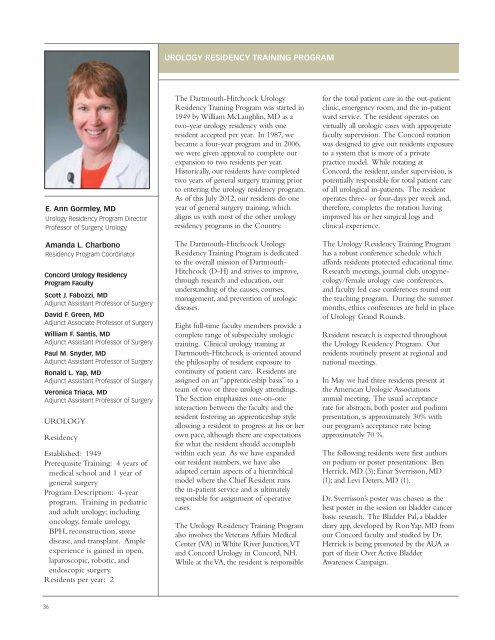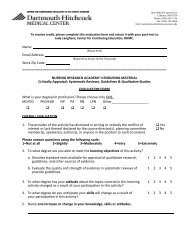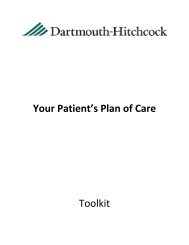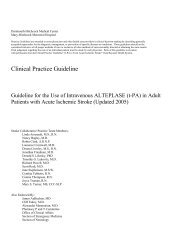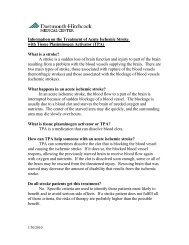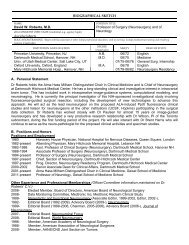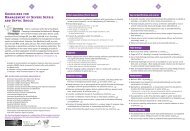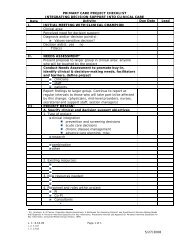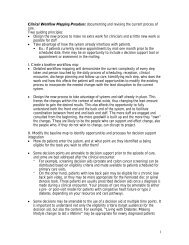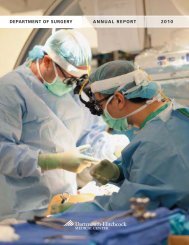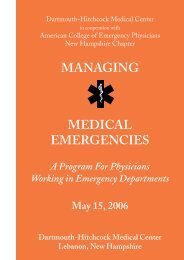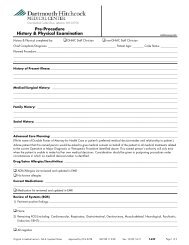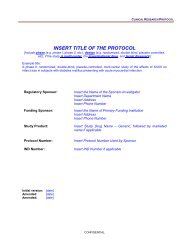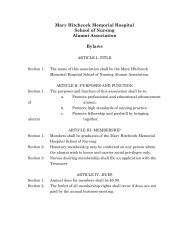2012 - Health Care Professionals - Dartmouth-Hitchcock
2012 - Health Care Professionals - Dartmouth-Hitchcock
2012 - Health Care Professionals - Dartmouth-Hitchcock
- No tags were found...
You also want an ePaper? Increase the reach of your titles
YUMPU automatically turns print PDFs into web optimized ePapers that Google loves.
UROLOGY RESIDENCY TRAINING PROGRAME. Ann Gormley, MDUrology Residency Program DirectorProfessor of Surgery, UrologyAmanda L. CharbonoResidency Program CoordinatorConcord Urology ResidencyProgram FacultyScott J. Fabozzi, MDAdjunct Assistant Professor of SurgeryDavid F. Green, MDAdjunct Associate Professor of SurgeryWilliam F. Santis, MDAdjunct Assistant Professor of SurgeryPaul M. Snyder, MDAdjunct Assistant Professor of SurgeryRonald L. Yap, MDAdjunct Assistant Professor of SurgeryVeronica Triaca, MDAdjunct Assistant Professor of SurgeryUROLOGYResidencyEstablished: 1949Prerequisite Training: 4 years ofmedical school and 1 year ofgeneral surgeryProgram Description: 4-yearprogram. Training in pediatricand adult urology; includingoncology, female urology,BPH, reconstruction, stonedisease, and transplant. Ampleexperience is gained in open,laparoscopic, robotic, andendoscopic surgery.Residents per year: 2The <strong>Dartmouth</strong>-<strong>Hitchcock</strong> UrologyResidency Training Program was started in1949 by William McLaughlin, MD as atwo-year urology residency with oneresident accepted per year. In 1987, webecame a four-year program and in 2006,we were given approval to complete ourexpansion to two residents per year.Historically, our residents have completedtwo years of general surgery training priorto entering the urology residency program.As of this July <strong>2012</strong>, our residents do oneyear of general surgery training, whichaligns us with most of the other urologyresidency programs in the Country.The <strong>Dartmouth</strong>-<strong>Hitchcock</strong> UrologyResidency Training Program is dedicatedto the overall mission of <strong>Dartmouth</strong>-<strong>Hitchcock</strong> (D-H) and strives to improve,through research and education, ourunderstanding of the causes, courses,management, and prevention of urologicdiseases.Eight full-time faculty members provide acomplete range of subspecialty urologictraining. Clinical urology training at<strong>Dartmouth</strong>-<strong>Hitchcock</strong> is oriented aroundthe philosophy of resident exposure tocontinuity of patient care. Residents areassigned on an “apprenticeship basis” to ateam of two or three urology attendings.The Section emphasizes one-on-oneinteraction between the faculty and theresident fostering an apprenticeship styleallowing a resident to progress at his or herown pace, although there are expectationsfor what the resident should accomplishwithin each year. As we have expandedour resident numbers, we have alsoadapted certain aspects of a hierarchicalmodel where the Chief Resident runsthe in-patient service and is ultimatelyresponsible for assignment of operativecases.The Urology Residency Training Programalso involves the Veterans Affairs MedicalCenter (VA) in White River Junction,VTand Concord Urology in Concord, NH.While at the VA, the resident is responsiblefor the total patient care in the out-patientclinic, emergency room, and the in-patientward service. The resident operates onvirtually all urologic cases with appropriatefaculty supervision. The Concord rotationwas designed to give our residents exposureto a system that is more of a privatepractice model. While rotating atConcord, the resident, under supervision, ispotentially responsible for total patient careof all urological in-patients. The residentoperates three- or four-days per week and,therefore, completes the rotation havingimproved his or her surgical logs andclinical experience.The Urology Residency Training Programhas a robust conference schedule whichaffords residents protected educational time.Research meetings, journal club, urogynecology/femaleurology case conferences,and faculty led case conferences round outthe teaching program. During the summermonths, ethics conferences are held in placeof Urology Grand Rounds.Resident research is expected throughoutthe Urology Residency Program. Ourresidents routinely present at regional andnational meetings.In May we had three residents present atthe American Urologic Associationsannual meeting. The usual acceptancerate for abstracts, both poster and podiumpresentation, is approximately 30% withour program’s acceptance rate beingapproximately 70 %.The following residents were first authorson podium or poster presentations: BenHerrick, MD (3); Einar Sverrisson, MD(1); and Levi Deters, MD (1).Dr. Sverrisson’s poster was chosen as thebest poster in the session on bladder cancerbasic research. The Bladder Pal, a bladderdiary app, developed by Ron Yap, MD fromour Concord faculty and studied by Dr.Herrick is being promoted by the AUA aspart of their Over Active BladderAwareness Campaign.36


